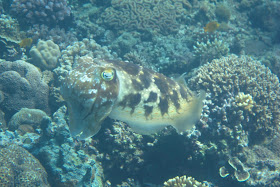Getting to Dumaguete on April 10th involved a hot two hour bus ride and a half hour ferry ride from Moalboal. Dumaguete is a coastal university town on the island of Negros. The SCUBA community is well established here, boasting of the famous Dauin muck diving and of Apo Island, one of the oldest marine sanctuaries in the Philippines.



Brian is studying connectivity between Marine Protected Areas (MPAs) and non protected areas around Southern Negros, Apo, Bohol and Southern Leyete regions. After meeting up with him to discuss the details of his work over a few beers, we decided to start on the 12th.

Our duties with Brian are very similar to those while we were helping on the GBR: we roll out the transect lines (this time there are three 50m transects) then wait for Brian and his co-worker, Oliver, to record all of the data they need before rolling the tapes back up.A typical dive lasts 60 - 80 minutes, with Brian counting large fish as we lay the transects and Oliver follows behind identifying corals every 0.5 meters. At the end of the third transect, Brian surveys the area for other fish while the person laying the tape - whichever one of us that might be - gets to hang out and enjoy the reef. When Oliver finishes the lats transect, Brian swims back counting the small fish, and we roll the tapes back up.
We do two dives in the morning, then go in for lunch and then do two dives in the afternoon. Brian actually only needs one of us to do the transect work so Woody and I alternate laying tape. The one who is not working either goes on the dive to take pictures and enjoys a "fun dive" or stays on the beach reading a book, drawing or getting to know the locals.


We do a mix of shore dives and boat dives depending on where the MPAs or the fishing areas are that Brian wants to compare (most are within an hour or two of Dumaguete). So far, there has been a lot of damage to the reefs from a typhoon that hit in December. Because of overfishing, many of the reefs we look at are void of large fish all together, and several are littered with garbage. Many of the MPAs we have surveyed have new fish traps and lots of fishing line in them - indicating that they are not being adequately protected but then we also find fishing areas that seem better stocked than the nearby MPA. It is hard to predict what we will find, even Brian who has been diving these reefs for five years now is surprised at the changes (good and bad) that he is seeing.




Brian's research is very important ground work of the MPAs and the local Costal Resource Managers (CRMs) are very appreciative. They are passionate about marine conservation - one even dragged up an armload of garbage while diving with us - but they are severely understaffed and under-funded. As one CRM told us, "We love the reefs so much, but there is only so much we can do." In addition to years of dynamite fishing (some of which is still occurring, illegally), seeing garbage along the roadsides, in the streams and finally on the reefs, you realize that saving the marine environment here is a bigger issue than just protecting the reefs. Many of the MPA's we have been surveying are fairly new (only 5 - 10 years old) and it will take many more years for the corals and fish populations to come back and much more regulation, education and enforcement to deal with the issue of all of that garbage.
Having said all of that, the diving is still wonderful and we have seen many amazing critters and wildlife. ribbon eels, manta shrimp, large tritons, sea snakes, giant cuttle fish, tutles, garden eels, and more feather duster worms than you could count in a lifetime..


On our days off, we've been exploring Dumaguete - its market, Silliman University and the myriad of restaurants - as well as the surrounding countryside. We took a lovely trip, just 6 km from the city, to the small town of Valencia where we hired a tricycle to Casa Roro a 200 foot waterfall with several swimming holes in the creek below - a wonderful respite from the heat of the Philippine summer.
After we're done working with Brian on April 24th, we plan to visit one of the local islands to do some recreational diving, snorkeling and sunset gazing before we head off to our next destination - Thailand.
To see more of our photos from Dumaguete, check out our Web Album





No comments:
Post a Comment